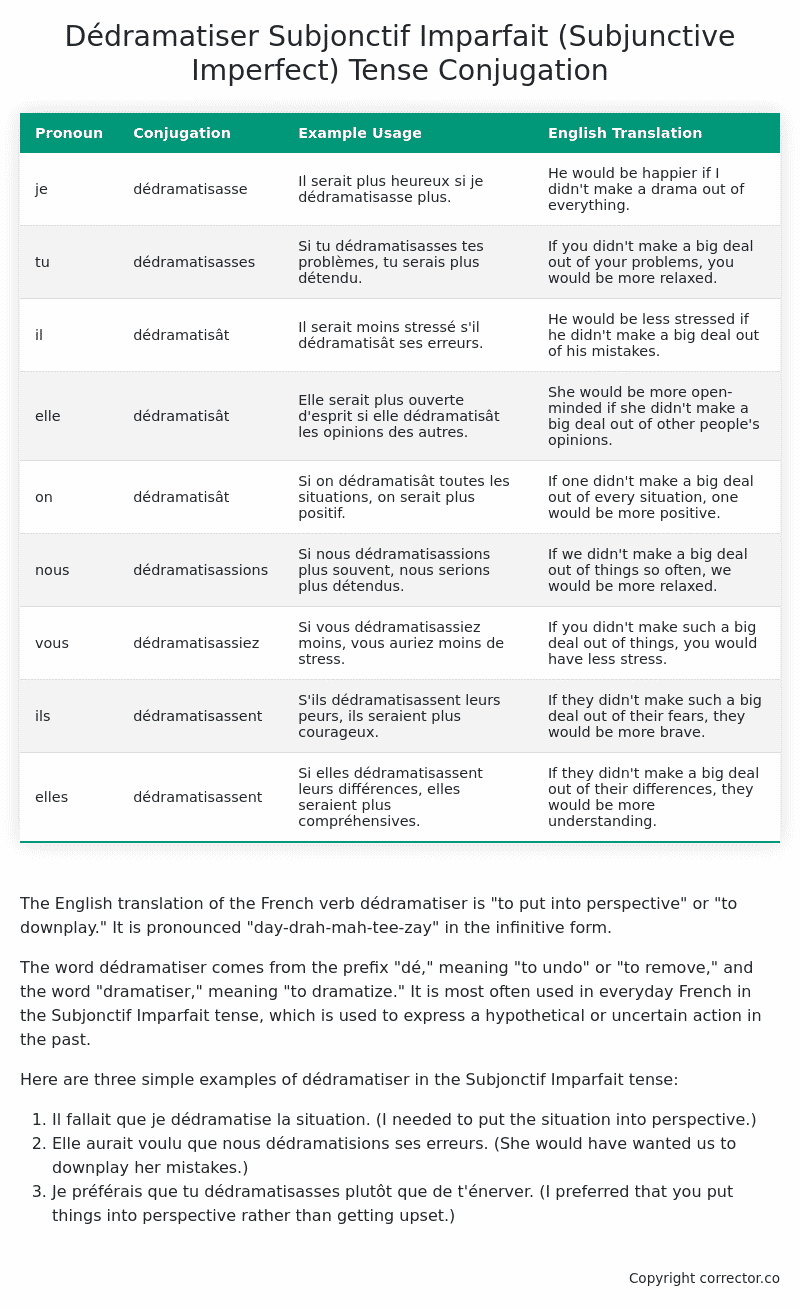Subjonctif Imparfait (Subjunctive Imperfect) Tense Conjugation of the French Verb dédramatiser
Introduction to the verb dédramatiser
The English translation of the French verb dédramatiser is “to put into perspective” or “to downplay.” It is pronounced “day-drah-mah-tee-zay” in the infinitive form.
The word dédramatiser comes from the prefix “dé,” meaning “to undo” or “to remove,” and the word “dramatiser,” meaning “to dramatize.” It is most often used in everyday French in the Subjonctif Imparfait tense, which is used to express a hypothetical or uncertain action in the past.
Here are three simple examples of dédramatiser in the Subjonctif Imparfait tense:
- Il fallait que je dédramatise la situation. (I needed to put the situation into perspective.)
- Elle aurait voulu que nous dédramatisions ses erreurs. (She would have wanted us to downplay her mistakes.)
- Je préférais que tu dédramatisasses plutôt que de t’énerver. (I preferred that you put things into perspective rather than getting upset.)
Table of the Subjonctif Imparfait (Subjunctive Imperfect) Tense Conjugation of dédramatiser
| Pronoun | Conjugation | Example Usage | English Translation |
|---|---|---|---|
| je | dédramatisasse | Il serait plus heureux si je dédramatisasse plus. | He would be happier if I didn’t make a drama out of everything. |
| tu | dédramatisasses | Si tu dédramatisasses tes problèmes, tu serais plus détendu. | If you didn’t make a big deal out of your problems, you would be more relaxed. |
| il | dédramatisât | Il serait moins stressé s’il dédramatisât ses erreurs. | He would be less stressed if he didn’t make a big deal out of his mistakes. |
| elle | dédramatisât | Elle serait plus ouverte d’esprit si elle dédramatisât les opinions des autres. | She would be more open-minded if she didn’t make a big deal out of other people’s opinions. |
| on | dédramatisât | Si on dédramatisât toutes les situations, on serait plus positif. | If one didn’t make a big deal out of every situation, one would be more positive. |
| nous | dédramatisassions | Si nous dédramatisassions plus souvent, nous serions plus détendus. | If we didn’t make a big deal out of things so often, we would be more relaxed. |
| vous | dédramatisassiez | Si vous dédramatisassiez moins, vous auriez moins de stress. | If you didn’t make such a big deal out of things, you would have less stress. |
| ils | dédramatisassent | S’ils dédramatisassent leurs peurs, ils seraient plus courageux. | If they didn’t make such a big deal out of their fears, they would be more brave. |
| elles | dédramatisassent | Si elles dédramatisassent leurs différences, elles seraient plus compréhensives. | If they didn’t make a big deal out of their differences, they would be more understanding. |
Other Conjugations for Dédramatiser.
Le Present (Present Tense) Conjugation of the French Verb dédramatiser
Imparfait (Imperfect) Tense Conjugation of the French Verb dédramatiser
Passé Simple (Simple Past) Tense Conjugation of the French Verb dédramatiser
Passé Composé (Present Perfect) Tense Conjugation of the French Verb dédramatiser
Futur Simple (Simple Future) Tense Conjugation of the French Verb dédramatiser
Futur Proche (Near Future) Tense Conjugation of the French Verb dédramatiser
Plus-que-parfait (Pluperfect) Tense Conjugation of the French Verb dédramatiser
Passé Antérieur (Past Anterior) Tense Conjugation of the French Verb dédramatiser
Futur Antérieur (Future Anterior) Tense Conjugation of the French Verb dédramatiser
Subjonctif Présent (Subjunctive Present) Tense Conjugation of the French Verb dédramatiser
Subjonctif Passé (Subjunctive Past) Tense Conjugation of the French Verb dédramatiser
Subjonctif Imparfait (Subjunctive Imperfect) Tense Conjugation of the French Verb dédramatiser (this article)
Conditionnel Présent (Conditional Present) Tense Conjugation of the French Verb dédramatiser
Conditionnel Passé (Conditional Past) Tense Conjugation of the French Verb dédramatiser
L’impératif Présent (Imperative Present) Tense Conjugation of the French Verb dédramatiser
L’infinitif Présent (Infinitive Present) Tense Conjugation of the French Verb dédramatiser
Struggling with French verbs or the language in general? Why not use our free French Grammar Checker – no registration required!
Get a FREE Download Study Sheet of this Conjugation 🔥
Simply right click the image below, click “save image” and get your free reference for the dédramatiser Subjonctif Imparfait tense conjugation!

Dédramatiser – About the French Subjonctif Imparfait (Subjunctive Imperfect) Tense
Formation
Common Everyday Usage Patterns
Interactions with Other Tenses
Subjonctif Présent
Indicatif Passé Composé
Conditional
Conditional Perfect
Summary
I hope you enjoyed this article on the verb dédramatiser. Still in a learning mood? Check out another TOTALLY random French verb conjugation!


